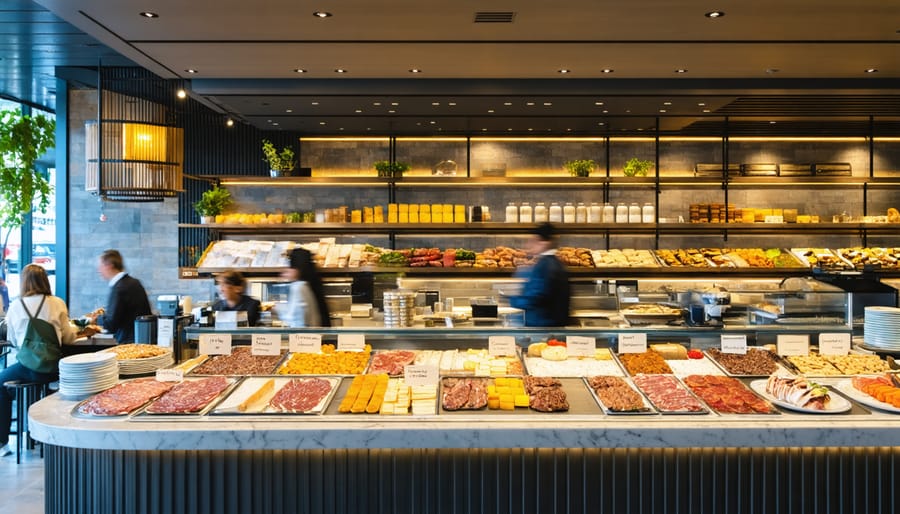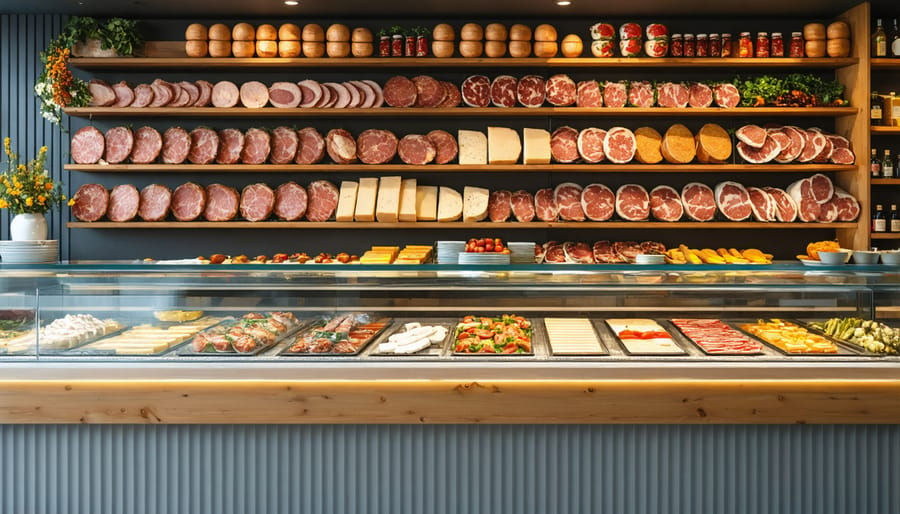
Step into the vibrant world of delicatessen franchising, where artisanal meats, imported cheeses, and carefully curated specialty foods create a symphony of culinary delight and business opportunity. As someone who transformed her passion for authentic deli experiences into a thriving franchise network, I’ve witnessed firsthand how this unique business model combines the charm of traditional delicatessens with modern entrepreneurial possibilities.
Picture yourself behind the counter of your own gourmet haven, where the aroma of freshly sliced pastrami mingles with the warmth of freshly baked artisan bread. The delicatessen franchise industry has experienced remarkable growth, with market analysts projecting a 4.8% annual increase through 2025, making it an attractive venture for food-loving entrepreneurs seeking a proven business model.
Today’s delicatessen franchises aren’t just about sandwiches and cold cuts – they’re about creating community gathering spaces where food lovers connect over premium ingredients and shared culinary experiences. Whether you’re dreaming of running a cozy neighborhood deli or expanding into multiple locations, the franchise model offers a structured path to success, complete with established supply chains, tried-and-tested recipes, and comprehensive training programs.
Let’s explore how you can become part of this delicious success story while maintaining the authentic charm that makes delicatessens so special.
Why Delicatessen Franchises Are Booming
The Modern Deli Renaissance
Today’s delis are embracing a delightful fusion of tradition and innovation, creating spaces that honor their heritage while catering to modern palates. Gone are the days when delis were solely about pastrami on rye – though that classic still holds a special place in our hearts! Modern delis are incorporating fresh, global flavors and accommodating diverse dietary preferences without losing their authentic charm.
I recently visited a renovated neighborhood deli that perfectly captures this evolution. Alongside traditional favorites, they offer Mediterranean-inspired wraps, grain bowls, and plant-based alternatives that would make our grandmothers raise their eyebrows in surprise. These contemporary touches aren’t replacing the classics – they’re enhancing them.
Health-conscious options like fresh-pressed juices and locally sourced ingredients now share counter space with traditional cured meats and pickles. Many successful deli franchises have embraced digital ordering systems and Instagram-worthy presentation while maintaining the warm, personal service that made delis neighborhood staples in the first place.
This blend of old and new isn’t just about staying relevant – it’s about creating gathering spaces where everyone feels welcome, regardless of their dietary preferences or culinary adventures.

ElleM’s Fresh Take on Classic Deli Culture
ElleM’s has masterfully reimagined the traditional delicatessen experience for today’s food-savvy customers. While honoring time-tested recipes and techniques, the brand brings a fresh perspective through its innovative menu offerings and modern aesthetic. The bright, airy spaces feature clean lines and Instagram-worthy presentation, moving away from the cluttered feel of old-school delis while maintaining their welcoming charm.
What truly sets ElleM’s apart is its commitment to conscious eating without sacrificing flavor. The menu thoughtfully balances classic comfort foods with contemporary health-conscious options, featuring house-made vegetarian alternatives alongside traditional favorites. Each location sources ingredients from local suppliers where possible, creating meaningful connections within their communities.
The brand’s signature “Heritage with a Twist” concept reimagines beloved deli staples. Think traditional pastrami on rye elevated with house-fermented vegetables, or classic matzo ball soup featuring seasonal ingredients. This approach resonates particularly well with millennials and young professionals seeking familiar comfort foods with modern sensibilities.
ElleM’s also prioritizes sustainability, using eco-friendly packaging and implementing waste reduction programs across all locations. This comprehensive approach to modernizing deli culture has created a unique position in the market, appealing to both traditionalists and contemporary food enthusiasts.
Building Your Delicatessen Empire with ElleM
The ElleM Franchise Blueprint
Starting your journey with ElleM’s delicatessen franchise is an exciting step towards business ownership that combines passion for food with entrepreneurial spirit. Our comprehensive blueprint for launching a successful franchise has been carefully crafted to support ambitious women in bringing their culinary dreams to life.
Understanding our franchise business model is your first step. We require an initial investment ranging from $250,000 to $400,000, which includes the franchise fee, equipment, initial inventory, and working capital. Our franchisees typically have a minimum net worth of $500,000 with at least $150,000 in liquid assets.
Beyond the financial requirements, we look for partners who share our values and vision. The ideal ElleM franchisee has a genuine passion for quality food, strong leadership abilities, and excellent people skills. Prior restaurant experience isn’t mandatory – our comprehensive training program covers everything from operations to marketing.
We provide extensive support throughout your journey, including:
– Four weeks of intensive initial training
– Site selection and lease negotiation assistance
– Store design and construction guidance
– Marketing and social media strategy support
– Ongoing operational consultation
– Access to our proprietary recipes and processes
Remember, Sarah from our Montreal location started with zero restaurant experience but had the drive to succeed. Today, she runs one of our most successful locations, proving that with the right support and determination, you can create something truly special.
Training and Support Systems
One of the most reassuring aspects of joining a delicatessen franchise is the comprehensive training and support you’ll receive. From my conversations with successful franchisees, this structured guidance often makes the difference between feeling overwhelmed and feeling confident as a new business owner.
Most established deli franchises offer an initial training program that typically spans 2-4 weeks. During this time, you’ll learn everything from proper food handling and preparation techniques to inventory management and point-of-sale systems. The best part? You don’t need prior restaurant experience – the training is designed to transform passionate beginners into capable deli owners.
Beyond the initial training, you’ll have access to ongoing support systems that help you navigate daily operations. This usually includes regular check-ins with franchise consultants, access to 24/7 technical support, and updated training materials as menu items or procedures evolve. Many franchises also provide marketing support, helping you plan local promotions and social media strategies.
What I particularly love about the franchise model is the community aspect. You’ll be connected with other franchisees through regular meetings, online forums, and annual conventions. These networking opportunities allow you to share experiences, troubleshoot challenges, and exchange successful strategies with fellow deli owners who understand exactly what you’re going through.
Remember, the goal of these support systems is to help you succeed – after all, your success is the franchise’s success too!

Menu Development and Sourcing
At the heart of every successful delicatessen franchise lies a carefully curated menu and robust sourcing strategy. Having worked with numerous franchise owners, I’ve seen firsthand how quality ingredients and consistent food preparation can make or break a deli’s success.
Most delicatessen franchises partner with pre-approved suppliers who understand the importance of maintaining consistent quality across all locations. These relationships often include national distributors for staple items and local vendors for specialty products, creating the perfect blend of reliability and regional charm.
The menu development process typically involves a dedicated culinary team that considers factors like ingredient availability, shelf life, and preparation complexity. Popular items often include signature sandwiches, house-made salads, and specialty soups that can be replicated consistently across all locations. Franchisors usually provide detailed recipe books and preparation guidelines, ensuring that a customer’s favorite turkey club tastes the same whether they’re in Boston or San Diego.
Quality control measures are essential and include regular supplier audits, standardized food handling procedures, and ongoing staff training. Many successful franchises implement digital inventory management systems to track ingredient freshness and maintain optimal stock levels. They also conduct periodic taste tests and quality assessments to ensure each location maintains the brand’s high standards.
Remember, while following corporate guidelines is crucial, there’s often room for seasonal specials and local favorites that help each franchise location maintain its unique community connection.
Real Success Stories from ElleM Franchisees

From Corporate Life to Deli Owner
Meet Sarah Thompson, a former marketing executive who found her true calling in the world of artisanal sandwiches and specialty foods. After fifteen years in the corporate world, Sarah took the bold step of transitioning from corporate career to become the proud owner of a thriving delicatessen franchise.
“I always dreamed of running my own business, but the security of my corporate job kept me in place,” Sarah shares. “What finally pushed me to make the change was realizing that my passion for food and connecting with people could actually become my career.”
Sarah’s corporate background proved invaluable in managing her deli franchise. Her experience with budgets, team leadership, and customer relations translated perfectly into running a successful food business. Within two years, her location became one of the top-performing stores in the franchise network.
“The beauty of joining a franchise system was that I didn’t have to figure everything out on my own,” she explains. “The established processes and support network made it possible for me to focus on what I love most – creating amazing food experiences for my community.”
Today, Sarah’s deli has become a neighborhood hub, serving everything from classic Reubens to innovative plant-based options. Her story proves that with the right franchise partnership, professional skills, and passion, career reinvention is not just possible – it’s deliciously rewarding.
Building a Family Legacy
The Martinez family’s delicatessen story began in 1965 when Maria and Carlos Martinez opened their first small sandwich shop in Brooklyn. What started as a humble corner deli has blossomed into a thriving franchise network spanning three generations and dozens of locations across the Northeast.
“My grandparents built this business on three principles: quality ingredients, authentic recipes, and treating customers like family,” shares Christina Martinez, who now oversees franchise operations. “Those values are still at the heart of everything we do today.”
The transition from family-owned single location to successful franchise model wasn’t always smooth. When Christina’s father Roberto took over in the 1990s, he carefully documented their tried-and-true processes, from their signature marinades to their customer service approach. This groundwork made franchising possible while preserving their cherished family recipes and traditions.
Today, the Martinez family personally trains each new franchisee, sharing not just their business expertise but their passion for authentic delicatessen fare. “We don’t just sell sandwiches,” Christina explains. “We’re sharing our family’s legacy, one location at a time.”
Their story illustrates how family values can scale successfully through franchising while maintaining the personal touch that made the original deli special. Each new franchise location becomes part of their extended family, carrying forward traditions that started over half a century ago behind a small deli counter in Brooklyn.
Financial Insights and Investment Overview
Let’s talk numbers, shall we? As someone who’s helped many aspiring business owners start your franchise journey, I understand that the financial aspects of a delicatessen franchise can seem daunting at first. The initial investment typically ranges from $150,000 to $350,000, depending on factors like location, size, and whether you’re purchasing an existing franchise or starting fresh.
Breaking this down, about 40% usually goes toward leasehold improvements and equipment, 25% for initial inventory and supplies, 20% for franchise fees and training, and the remaining 15% for working capital and marketing. The good news? Many franchisors have relationships with lenders who understand the business model and can help finance your dream.
In terms of ROI, successful delicatessen franchises often see profit margins between 10-15% after the first year, with potential for growth as operations stabilize. Most franchisees report breaking even within 18-24 months, though this timeline can vary based on location and market conditions.
Monthly operating costs typically include:
– Food and inventory: 30-35% of revenue
– Labor: 25-30% of revenue
– Rent and utilities: 8-12% of revenue
– Royalty fees: 4-6% of revenue
– Marketing contributions: 2-3% of revenue
What I love about the delicatessen franchise model is its resilience. Even during economic downturns, people still crave quality sandwiches and specialty foods. Many of my mentees have found success by focusing on both dine-in and catering services, effectively creating multiple revenue streams.
Remember, these numbers are averages, and your actual results may vary. The key is thorough research and planning before making the investment. Consider working with a financial advisor who specializes in franchise businesses to create a detailed business plan tailored to your specific situation.
Starting a delicatessen franchise could be your gateway to becoming a successful business owner in the thriving food industry. As we’ve explored throughout this article, the combination of time-tested business models, established brand recognition, and ongoing support makes franchise ownership an attractive option for aspiring entrepreneurs.
Remember, success in this venture requires more than just a love for great food – it demands dedication, careful planning, and a willingness to learn. The initial investment might seem substantial, but the potential returns, both financial and personal, can make it worthwhile. Many of our community members have shared how owning a deli franchise has allowed them to create their own schedule while building a sustainable business that brings joy to their local community.
If you’re feeling inspired to take the next step, start by reaching out to several franchise brands that align with your values and vision. Request their Franchise Disclosure Documents, and take time to thoroughly review the requirements and expectations. Consider speaking with current franchisees to get firsthand insights into daily operations and challenges.
Don’t forget to consult with financial advisors and legal professionals before making any commitments. They can help you understand the fine print and ensure you’re making an informed decision. Whether you’re looking to transition from corporate life or start your entrepreneurial journey, a delicatessen franchise could be the perfect blend of passion and profession.



